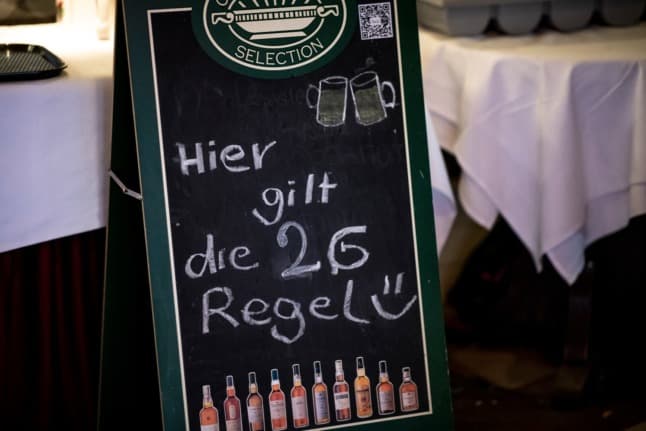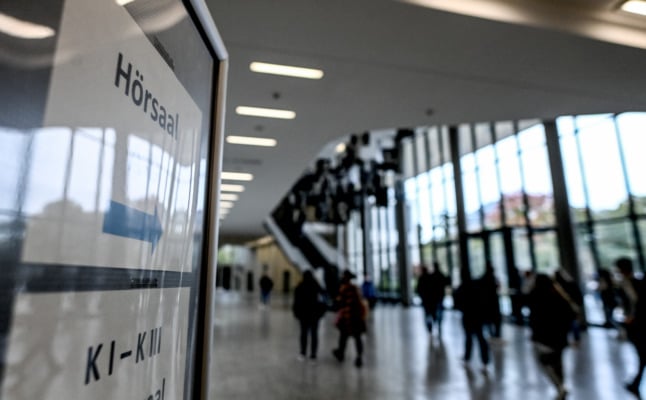Everything you need to know about Berlin's latest Covid restrictions

With rapidly increasing infection numbers, Germany’s capital city introduced further restrictions to fight the fourth wave of the pandemic. Here's what you need to know.
As of Wednesday, the 7-day incidence rate in Berlin reached a high of 339. Here is a breakdown of the current measures in place to curb the growing numbers.
Mostly 2G for public and cultural life
On Monday, November 15th, the 2G rule came into force across most of the nation’s capital, meaning that the following events, services and facilities are only allowed to admit vaccinated (geimpft) and recovered (genesen) people:
- all events with more than 20 people, including private parties.
- personal care services, such as hairdressers and beauty salons
- restaurants and other catering establishments
- museums, cinemas, clubs, theaters, concert halls and similar cultural institutions
- sightseeing tours, guided tours and similar tourist services
- covered sports facilities including gyms and indoor swimming pools
- saunas, thermal baths and similar facilities
- amusement arcades, amusement parks and similar establishments
- outdoor events with more than 2000 people
Proof of vaccination and recovery will now have to be shown in digital form via the federal government's Corona Warn app, the Robert Koch Institute's CovPass app or with printed QR codes. The yellow vaccination booklets will no longer be accepted as a valid form of vaccination proof.
Are there any exceptions?
Children and young people under the age of 18, and people who cannot be vaccinated for medical reasons, may attend 2G events and use 2G facilities. However, they must present negative corona tests and, for adults, the medical reason why a vaccination is not possible. This can generally be done by presenting a letter from a GP.
2G-plus being considered
The Berlin Senate has left open the question of whether the 2G-plus rule - potentially requiring vaccinated and recovered people to provide negative corona tests or to wear masks - may come into force. Some form of this rule could be rolled out following the crisis meeting between the government and the heads of Germany’s 16 regional states on Thursday.
READ ALSO:
- Berlin to exclude unvaccinated people from indoor dining, bars and hairdressers
- EXPLAINED: Germany’s planned Covid restrictions to fight fourth wave
Retail sector
The retail sector is exempt from 2G and 3G rules. Instead, the number of visitors to retail facilities must be limited so that they can maintain the minimum distance from each other and customers must wear a medical mask. There is no obligation to register attendance via the Luca App or contact forms.
Public transport
Unlike in other states, a 3G rule for public transport is not envisaged to come into force. However, passengers are required to wear an FFP2 mask in all forms of public transport, or risk a fine of between 50 and 500 euros.
Universities and libraries
2G is also not being enforced in universities and libraries, and instead the 3G model (vaccinated, recovered or tested) remains in place.

Students return to Berlin's Free University after months of distance learning on October 4th, 2021. Universities in Berlin will still apply the 3G rule. Photo: picture alliance/dpa/dpa-Zentralbild | Britta Pedersen
Kindergartens
Child day care facilities remain open as usual, with parents being given rapid antigen tests for two weekly tests per child, and are asked to test their children regularly for coronavirus.
Employees who are not vaccinated or recovered, and who come into contact with children are required to be tested for coronavirus twice a week.
Schools
Compulsory attendance still applies in Berlin schools and students and school staff are required to wear a medical mask indoors.
In Berlin, all students and also all employees who are in regular contact with students are required to test themselves at school three times a week.
Hotels
In hotels and guesthouses, guests who aren't vaccinated against Covid or recently recovered must test negative for coronavirus on the day of arrival and then show proof of a negative test result every third day of their stay.
There is some confusion however, as many hotel restaurants may not be used by unvaccinated or not-recovered guests: if the restaurant is physically separated and has a separate entrance, it may be opened to the public and thus falls under the 2G rule.
Christmas markets
The decision of whether or not to use a 2G or 3G model has been left to the individual organizers of the Berlin Christmas markets. If access is open to everyone, masks are will be mandatory and visitors must comply with the distance rules. Many market operators, for example, the owners of the Gendarmenmarkt 'Weinachtszauber' and Rotes Rathaus Christmas markets in Mitte, have opted to only allow access for vaccinated and recovered persons.
READ ALSO: Berlin allows Christmas markets to exclude unvaccinated people
Working from home
Employers are encouraged to allow their employees to work from home so that office jobs are filled at a maximum of 50 percent, unless there are important reasons to the contrary. Where physical attendance in the office is necessary, employers must provide their employees with two Corona tests per week free of charge.
Free testing
Free antigen rapid tests are now available again to everyone at least once a week at state-owned and commercial testing centers.
Comments
See Also
As of Wednesday, the 7-day incidence rate in Berlin reached a high of 339. Here is a breakdown of the current measures in place to curb the growing numbers.
Mostly 2G for public and cultural life
On Monday, November 15th, the 2G rule came into force across most of the nation’s capital, meaning that the following events, services and facilities are only allowed to admit vaccinated (geimpft) and recovered (genesen) people:
- all events with more than 20 people, including private parties.
- personal care services, such as hairdressers and beauty salons
- restaurants and other catering establishments
- museums, cinemas, clubs, theaters, concert halls and similar cultural institutions
- sightseeing tours, guided tours and similar tourist services
- covered sports facilities including gyms and indoor swimming pools
- saunas, thermal baths and similar facilities
- amusement arcades, amusement parks and similar establishments
- outdoor events with more than 2000 people
Proof of vaccination and recovery will now have to be shown in digital form via the federal government's Corona Warn app, the Robert Koch Institute's CovPass app or with printed QR codes. The yellow vaccination booklets will no longer be accepted as a valid form of vaccination proof.
Are there any exceptions?
Children and young people under the age of 18, and people who cannot be vaccinated for medical reasons, may attend 2G events and use 2G facilities. However, they must present negative corona tests and, for adults, the medical reason why a vaccination is not possible. This can generally be done by presenting a letter from a GP.
2G-plus being considered
The Berlin Senate has left open the question of whether the 2G-plus rule - potentially requiring vaccinated and recovered people to provide negative corona tests or to wear masks - may come into force. Some form of this rule could be rolled out following the crisis meeting between the government and the heads of Germany’s 16 regional states on Thursday.
READ ALSO:
- Berlin to exclude unvaccinated people from indoor dining, bars and hairdressers
- EXPLAINED: Germany’s planned Covid restrictions to fight fourth wave
Retail sector
The retail sector is exempt from 2G and 3G rules. Instead, the number of visitors to retail facilities must be limited so that they can maintain the minimum distance from each other and customers must wear a medical mask. There is no obligation to register attendance via the Luca App or contact forms.
Public transport
Unlike in other states, a 3G rule for public transport is not envisaged to come into force. However, passengers are required to wear an FFP2 mask in all forms of public transport, or risk a fine of between 50 and 500 euros.
Universities and libraries
2G is also not being enforced in universities and libraries, and instead the 3G model (vaccinated, recovered or tested) remains in place.

Students return to Berlin's Free University after months of distance learning on October 4th, 2021. Universities in Berlin will still apply the 3G rule. Photo: picture alliance/dpa/dpa-Zentralbild | Britta Pedersen
Kindergartens
Child day care facilities remain open as usual, with parents being given rapid antigen tests for two weekly tests per child, and are asked to test their children regularly for coronavirus.
Employees who are not vaccinated or recovered, and who come into contact with children are required to be tested for coronavirus twice a week.
Schools
Compulsory attendance still applies in Berlin schools and students and school staff are required to wear a medical mask indoors.
In Berlin, all students and also all employees who are in regular contact with students are required to test themselves at school three times a week.
Hotels
In hotels and guesthouses, guests who aren't vaccinated against Covid or recently recovered must test negative for coronavirus on the day of arrival and then show proof of a negative test result every third day of their stay.
There is some confusion however, as many hotel restaurants may not be used by unvaccinated or not-recovered guests: if the restaurant is physically separated and has a separate entrance, it may be opened to the public and thus falls under the 2G rule.
Christmas markets
The decision of whether or not to use a 2G or 3G model has been left to the individual organizers of the Berlin Christmas markets. If access is open to everyone, masks are will be mandatory and visitors must comply with the distance rules. Many market operators, for example, the owners of the Gendarmenmarkt 'Weinachtszauber' and Rotes Rathaus Christmas markets in Mitte, have opted to only allow access for vaccinated and recovered persons.
READ ALSO: Berlin allows Christmas markets to exclude unvaccinated people
Working from home
Employers are encouraged to allow their employees to work from home so that office jobs are filled at a maximum of 50 percent, unless there are important reasons to the contrary. Where physical attendance in the office is necessary, employers must provide their employees with two Corona tests per week free of charge.
Free testing
Free antigen rapid tests are now available again to everyone at least once a week at state-owned and commercial testing centers.
Join the conversation in our comments section below. Share your own views and experience and if you have a question or suggestion for our journalists then email us at [email protected].
Please keep comments civil, constructive and on topic – and make sure to read our terms of use before getting involved.
Please log in here to leave a comment.